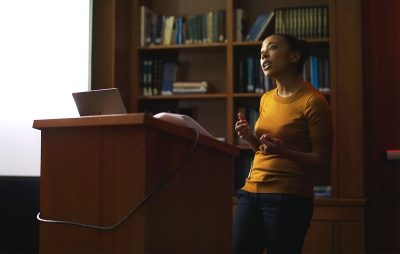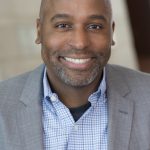
Approximately 15 people gathered in Boston University’s Florence and Chafetz Hillel House Wednesday evening for a lecture by history professor Ashley Farmer, titled “Office After Hours: The Black Revolutionary Woman.”
The discussion was inspired by the book Farmer is currently writing, “Remaking Black Power: How Black Women Transformed the Movement.”
Farmer said the project began when she came to BU in September to study black women of the 1960s, but found that very little information existed on the topic.
“Nobody had really told their story, and nobody had realized all the different ways that they contributed to civil rights and black power,” Farmer said before the lecture.
Associate Director of Alumni Relations Sarah Speltz, who was also the organizer of Wednesday’s talk, said she approached Farmer about the talk because of how Farmer’s research fits in with the variety of culturally and historically relevant topics BU wants to offer its alumni and students.
Farmer’s lecture focused specifically on how women changed the views and goals of the Black Panther Party during the 1960s. Farmer said the original goal of the Black Panthers was to create a separate black nation, until women joined the group and shifted its goals to fighting capitalism and racism in America.
Farmer spoke about Tarika Lewis, the first female member of the Black Panthers, who joined when she was 16, quickly becoming an artist for the Black Panther newspaper. Her drawings featured women in positions of militaristic power, which was unusual in the party.
“The idea behind this is that for a revolutionary, the common bond is not maleness but militancy,” Farmer said. “This idea quickly gained hold, as women who joined the Black Panthers in their early years embodied this ideal.”
Another Black Panther leader, Kathleen Cleaver, was extremely vocal, Farmer said, reporting on court proceedings and creating propaganda advocating for the release of incarcerated Panthers before sitting on the leading council in California.
Farmer spoke about how these efforts have gone largely unrecognized by historians, in part because of the tendency to look at history from a male perspective.
“Even if the leaders of the party were men, the members are often women,” Farmer said.
Farmer said as the movement expanded across the country, women founded and led Black Panther chapters in different areas, eventually holding positions equivalent to those of men.
“We should move past the idea that black women didn’t participate in the movement because of sexism,” Farmer said. “It wasn’t totalizing … there were key ways in which women fought back and shifted the parameters in which they worked.”
Farmer said the Black Panther women were powerful figures who “reshaped a movement,” through their artwork, literature and roles in the party. She spoke about how they reshaped the views of Black Panther men, many of whom originally espoused ideas of strict female submission.
Farmer concluded the talk by quoting Panther leader Eldridge Cleaver.
“We must purge our ranks and our hearts and our mind of any understanding of chauvinism, chauvinistic behavior or disrespectful behavior towards women,” Farmer quoted.
The lecture drew audience members in part because of its relevance to issues facing women and minority groups in America today.
Gregg Carlo, a leadership gift officer at the College of Arts and Sciences said he thought the presentation was “fantastic.”
“I’m very interested in human rights and also the political climate historically and as it pertains to today, and I’m always interested in hearing the perspective of our faculty here at Boston University,” Carlo said. “I learned a great deal, and it’s fascinating to see the relationship of feminism to the fight for racial equality in a very tumultuous time.”
African Studies Center Director of Outreach Barbara Brown said she came to the event because of her friendship with Mama Charlotte, a Black Panthers leader who now lives in Tanzania.
“When I saw that Ashley [Farmer] was doing this talk, it was like ‘Oh, I have to be there,’” Brown said. “We live in an unjust society; we are not unique in that way.”





This event sounds awesome! I wish I’d heard about it. I would’ve gone!